The COVID-19 pandemic created several significant challenges for Chicago businesses. From shelter at home, forced business closures to modified operating hours and consumer concerns about virus transmission, it has not been an easy journey. As the widespread distribution of the vaccine continues, government regulations are gradually being lifted permitting a return to pre-pandemic norms. One of the “side effects” of the pandemic was an increase in M&A activity as new opportunities began presenting themselves. In fact, M&A activity rebounded in the second half of 2020 and isn’t showing any signs of slowing down. However, what has changed is how business valuations are conducted, including how company and intangible assets value is determined. To help, clients, prospects and others, Selden Fox has provided a summary of the key COVID-19 valuation considerations below.
Valuation Methodologies
There are two basic approaches to business valuations: income and market-based. Income-based methodologies include discounted cash flow analysis or net income. Market-based methodologies range from market multiples, like price-to-earnings, using data from similar companies.
Both approaches have had to shift since the start of the pandemic, and some may be more appropriate than others as the pandemic becomes a thing of the past. It is more common now to use the discounted cash flow method to better capture short-term marketplace changes. The timeframe to use in the valuation can vary between two or three years, or longer.
In the pandemic’s early months, valuation guidance centered around more frequent valuations, known liquidity risks, and reassessing assumptions. Even now, uncertainty is risk when it comes to valuations, and there is plenty of it. But the focus has shifted to informed decisions and more judgment. Arriving at a fair valuation is arguably harder in most industries than pre-COVID, but not impossible.
COVID-19 Valuation Considerations
Chicago business owners and investors must keep in mind that valuations measure future projections, not current operating conditions. Three factors to consider when approaching valuations post-COVID are uncertainty, inputs, and new operating models.
Uncertainty
Many valuation experts can compare the uncertainty of COVID-19 to the aftermath of the 2008 financial crisis. Fortunately, valuations conducted after industries largely reopened are operating under better known circumstances than those in 2020. Despite that, U.S. tax laws and regulations continue to change, supply chain disruptions persist, and revenue still may not reflect pre-pandemic levels. It is unclear how long the return to normal will take, or what normal will even look like.
One way valuation experts are approaching uncertainty is to evaluate the average range between the highest and lowest profit estimates for a group of similar companies in an industry. Unsurprisingly, the industries experiencing the highest ranges in profit estimates are airlines, oil, gas and consumable fuels, hotels, restaurants and leisure, and specialty retail. More stable industries are software, biotechnology, and pharmaceuticals.
Inputs
One of the most difficult parts of valuations during COVID-19 has been forecasting expected cash flows. Concurrently, cash flow is one of the most important inputs in the valuation process. Since little is known about how and when a full recovery will occur, it is difficult for speculative information to be used in the valuation determination process.
New Operating Models
Since the start of the pandemic, most businesses had to pivot to meet the changing demands of a new economy. Restaurants shifted to online ordering and delivery, healthcare providers pivoted to remote visits, and education went remote. Many businesses no longer have the need to maintain as large of office space, and even patient facilities may be reconsidered in the future given remote options that may continue in our new normal. The resulting effect is that cost structures may be materially impacted due to what will be long-term, possibly permanent changes.
Impact of COVID-19 Relief Legislation
COVID-19 legislation like the CARES Act and its related financial support packages including the PPP, EIDL, other SBA-related programs, and subsequent legislation created one-time cash flow events that altered company valuations. For example, the Net Operating Loss deduction that was temporarily repealed caused some businesses to receive immediate tax refunds. These types of one-time changes increased expected cash flows, which affect net income and certain valuation methodologies.
Key Considerations Related to COVID-19 Relief Legislation
- The treatment of PPP loans and whether they were forgiven or if portions are to be treated as low-interest loans.
- If the company received a temporary loan deferral from an existing SBA loan, which then altered cash flow, increased net income, and affected cost of capital.
- Whether certain CARES Act provisions altered company multiples due to industry-wide changes.
- If the company accepted CARES Act-related funds and whether that meant the company was in financial distress
- Along the same point, whether accepting CARES Act funds would indicate future financial position.
- If the company used or is using certain tax credits, like the Employee Retention Tax Credit or other payroll tax credits.
With COVID-19, the valuation date is important in terms of what was known or what was still uncertain. An understanding of how the industry was impacted as a whole and continues to recover will be helpful in determining value. Any one-time revenue or expense events should be removed from the company’s income stream and corresponding adjustments made to account for them.
Recommendations
Given the ongoing uncertainty of a post-COVID economy, businesses can take some steps to improve their valuations over the next several months. This includes reviewing their current cash balance and preparing cash flow projections monthly over the next year, especially for businesses looking to sell. Additionally, companies can perform financial projections and business plans for the next three years, so that some post-COVID scenarios are easier to project.
Businesses will need to continue to pivot, adjust, and be proactive as new and emerging opportunities emerge. Two lessons that COVID-19 taught us are the value of listening to the needs of the audience and adapting to changing conditions.
Contact Us
The pandemic certainly created new and challenging circumstances for Chicago business owners, especially for those looking to sell a business. Despite the unprecedented situation, business valuation methods and assumptions can be revised to paint an accurate value of a business or asset. If you have questions about the information outlined above or need assistance with a valuation, Selden Fox can help. For additional information call us at 630.954.1400 or click here to contact us. We look forward to speaking with you soon.





